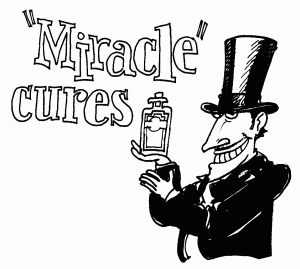Looking to lose weight from your sofa? Keen to re-grow hair you last saw in a bygone millennium? How about pecs and buns of steel in a few short weeks? A host of TV and magazine ads and websites offer miracle cures and aids for a range of conditions, but the NHS is warning that medicines and treatments that are not prescribed by a qualified health professional could be a waste of money or cause you serious harm. While television and the printed press can be and is regulated, an ad must first have appeared before it can be brought to the attention of the Advertising Standards Authority. No such regulation is currently possible for web-based advertising.
The Office of Fair Trading says that every year hundreds of thousands of consumers buy scam miracle cures for conditions such as excess weight, baldness and impotence. These products are usually ineffective and some can also be dangerous. The best advice is never to start a new medicine or stop a medicine that has been prescribed for you without speaking to a qualified health professional, such as your GP or a pharmacist.
Buying medicines online
Some websites offer new medicines and treatments, alongside eye-catching claims about how well they work. But they may not have been tested properly, and this means they may not work at all. Alternatively, they may cause harmful side effects or react adversely with professionally prescribed medicines or even ordinary everyday products, such as foods, creams or cosmetics.
Other websites appear to sell recognised and established prescription medicines, which a doctor may have prescribed for you in the past. However, these medicines may not be real and may not contain the same ingredients or dosages. If you have a health condition and you stop taking a medicine prescribed for you in order to take a new medicine you bought online, even if it appears to be the same, your health condition may get worse.
In addition, if you take prescription-only medicines intended for someone else, you risk taking medicines that are not safe or right for you. When a health professional prescribes medicines, it is done with reference to the medical history of the individual concerned. It is feasible that you are not aware of contraindications in your own history, such as illnesses or reactions you suffered as a child or inherited genetic characteristics.
The Medicines and Healthcare products Regulatory Agency (MHRA) is responsible for medicines regulation. It warns that medicines bought from websites cannot be guaranteed to meet set standards of safety and effectiveness.
See the MHRA website for more information about the risks of buying medicines over the internet.
Would you be fooled?
The Office of Fair Trading has teamed up with Sense About Science, a charitable trust, to warn of the dangers of online miracle cures.
Their website advertises Fatfoe pads. This product “sucks out excess fat and cellulite while you sleep”, allowing users to lose up to 20 pounds a week without changing their diet.
But readers who try to order from this website will be directed to a page that explains that the products are fake and warns of the dangers of similar online scams.
Common medicines scams
Thousands of websites offer scam health products for sale online. Beware of websites that:
Promise a “new miracle cure” or “wonder breakthrough”. In reality, their products are probably not tested or proven to work.
Try to convince you with testimonials from previous customers. How do you know these testimonials are genuine? Even if they are genuine, anecdotal evidence such as this is not the same as the scientific evidence that genuine medicines are based on.
Offer “no risk” money-back guarantees. Try to get your money back, and the scammers will disappear.
Contain endorsements from a doctor or health professional who quotes scientific evidence. Look closer, and you’ll see that these “doctors” are not attached to any known institution or clinical practice, and the “evidence” hasn’t been published in a recognised journal.
Medicines the right way
When it comes to medicines, the right approach is to speak to a qualified health professional first. Your GP can help with a range of medicines issues, whether you think you may have a health condition and want to know if medicines can help, or you’re already taking medicines and have questions about them.
Your local pharmacist can also help with medicines questions. If you’re already taking medicines, they can offer a Medicines Use Review, in which they will talk through your medicines with you. Any medicines that have been prescribed or bought over the counter will come with a patient information leaflet. This contains important information about their safe and effective use.











